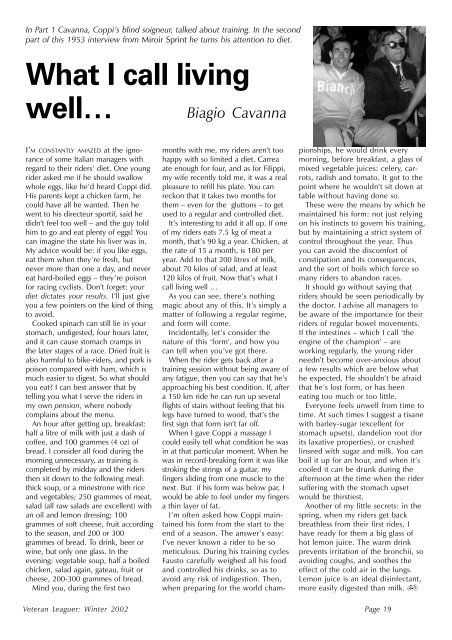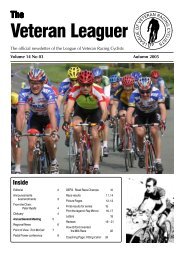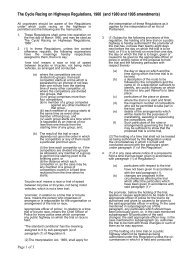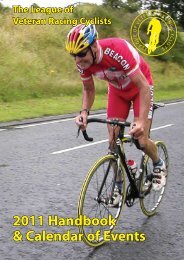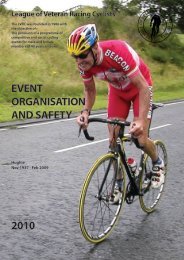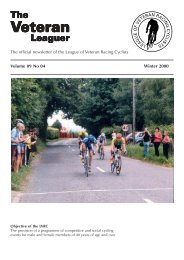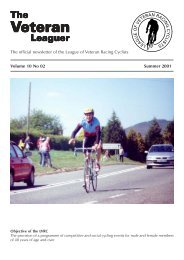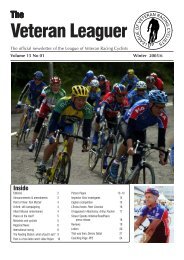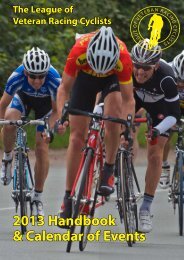Create successful ePaper yourself
Turn your PDF publications into a flip-book with our unique Google optimized e-Paper software.
In Part 1 Cavanna, Coppi’s blind soigneur, talked about training. In the second<br />
part of this 1953 interview from Miroir Sprint he turns his attention to diet.<br />
What I call living<br />
well…<br />
Biagio Cavanna<br />
I’M CONSTANTLY AMAZED at the ignorance<br />
of some Italian managers with<br />
regard to their riders’ diet. One young<br />
rider asked me if he should swallow<br />
whole eggs, like he’d heard Coppi did.<br />
His parents kept a chicken farm, he<br />
could have all he wanted. Then he<br />
went to his directeur sportif, said he<br />
didn’t feel too well – and the guy told<br />
him to go and eat plenty of eggs! You<br />
can imagine the state his liver was in.<br />
My advice would be: if you like eggs,<br />
eat them when they’re fresh, but<br />
never more than one a day, and never<br />
eat hard-boiled eggs – they’re poison<br />
for racing cyclists. Don’t forget: your<br />
diet dictates your results. I’ll just give<br />
you a few pointers on the kind of thing<br />
to avoid.<br />
Cooked spinach can still lie in your<br />
stomach, undigested, four hours later,<br />
and it can cause stomach cramps in<br />
the later stages of a race. Dried fruit is<br />
also harmful to bike-riders, and pork is<br />
poison compared with ham, which is<br />
much easier to digest. So what should<br />
you eat? I can best answer that by<br />
telling you what I serve the riders in<br />
my own pension, where nobody<br />
complains about the menu.<br />
An hour after getting up, breakfast:<br />
half a litre of milk with just a dash of<br />
coffee, and 100 grammes (4 oz) of<br />
bread. I consider all food during the<br />
morning unnecessary, as training is<br />
completed by midday and the riders<br />
then sit down to the following meal:<br />
thick soup, or a minestrone with rice<br />
and vegetables; 250 grammes of meat,<br />
salad (all raw salads are excellent) with<br />
an oil and lemon dressing; 100<br />
grammes of soft cheese, fruit according<br />
to the season, and 200 or 300<br />
grammes of bread. To drink, beer or<br />
wine, but only one glass. In the<br />
evening: vegetable soup, half a boiled<br />
chicken, salad again, gateau, fruit or<br />
cheese, 200-300 grammes of bread.<br />
Mind you, during the first two<br />
months with me, my riders aren’t too<br />
happy with so limited a diet. Carrea<br />
ate enough for four, and as for Filippi,<br />
my wife recently told me, it was a real<br />
pleasure to refill his plate. You can<br />
reckon that it takes two months for<br />
them – even for the gluttons – to get<br />
used to a regular and controlled diet.<br />
It’s interesting to add it all up. If one<br />
of my riders eats 7.5 kg of meat a<br />
month, that’s 90 kg a year. Chicken, at<br />
the rate of 15 a month, is 180 per<br />
year. Add to that 200 litres of milk,<br />
about 70 kilos of salad, and at least<br />
120 kilos of fruit. Now that’s what I<br />
call living well …<br />
As you can see, there’s nothing<br />
magic about any of this. It’s simply a<br />
matter of following a regular regime,<br />
and form will come.<br />
Incidentally, let’s consider the<br />
nature of this ‘form’, and how you<br />
can tell when you’ve got there.<br />
When the rider gets back after a<br />
training session without being aware of<br />
any fatigue, then you can say that he’s<br />
approaching his best condition. If, after<br />
a 150 km ride he can run up several<br />
flights of stairs without feeling that his<br />
legs have turned to wood, that’s the<br />
first sign that form isn’t far off.<br />
When I gave Coppi a massage I<br />
could easily tell what condition he was<br />
in at that particular moment. When he<br />
was in record-breaking form it was like<br />
stroking the strings of a guitar, my<br />
fingers sliding from one muscle to the<br />
next. But if his form was below par, I<br />
would be able to feel under my fingers<br />
a thin layer of fat.<br />
I’m often asked how Coppi maintained<br />
his form from the start to the<br />
end of a season. The answer’s easy:<br />
I’ve never known a rider to be so<br />
meticulous. During his training cycles<br />
Fausto carefully weighed all his food<br />
and controlled his drinks, so as to<br />
avoid any risk of indigestion. Then,<br />
when preparing for the world championships,<br />
he would drink every<br />
morning, before breakfast, a glass of<br />
mixed vegetable juices: celery, carrots,<br />
radish and tomato. It got to the<br />
point where he wouldn’t sit down at<br />
table without having done so.<br />
These were the means by which he<br />
maintained his form: not just relying<br />
on his instincts to govern his training,<br />
but by maintaining a strict system of<br />
control throughout the year. Thus<br />
you can avoid the discomfort of<br />
constipation and its consequences,<br />
and the sort of boils which force so<br />
many riders to abandon races.<br />
It should go without saying that<br />
riders should be seen periodically by<br />
the doctor. I advise all managers to<br />
be aware of the importance for their<br />
riders of regular bowel movements.<br />
If the intestines – which I call ‘the<br />
engine of the champion’ – are<br />
working regularly, the young rider<br />
needn’t become over-anxious about<br />
a few results which are below what<br />
he expected. He shouldn’t be afraid<br />
that he’s lost form, or has been<br />
eating too much or too little.<br />
Everyone feels unwell from time to<br />
time. At such times I suggest a tisane<br />
with barley-sugar (excellent for<br />
stomach upsets), dandelion root (for<br />
its laxative properties), or crushed<br />
linseed with sugar and milk. You can<br />
boil it up for an hour, and when it’s<br />
cooled it can be drunk during the<br />
afternoon at the time when the rider<br />
suffering with the stomach upset<br />
would be thirstiest.<br />
Another of my little secrets: in the<br />
spring, when my riders get back<br />
breathless from their first rides, I<br />
have ready for them a big glass of<br />
hot lemon juice. The warm drink<br />
prevents irritation of the bronchii, so<br />
avoiding coughs, and soothes the<br />
effect of the cold air in the lungs.<br />
Lemon juice is an ideal disinfectant,<br />
more easily digested than milk. V<br />
<strong>Veteran</strong> Leaguer: Winter 2002 Page 19


